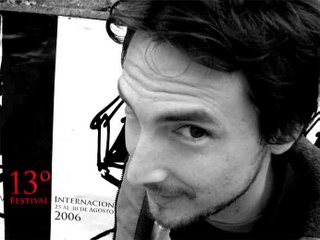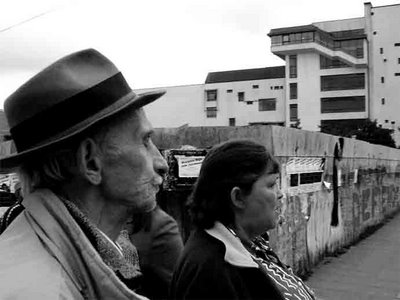 The clasico Tur-Bus service is the crappiest spike in the Tur-Bus service trident. The other two are the "ejecutivo", which you can bet has not one single "ejecutivo" on it, and "cama", which is essentially a bus full of jerk-offs lying horizontally. "Clasico", by the way, is code for "there's no way my legs are fitting in there!" Since our bus was a night bus, complete with blankets contaminated with chicken pox and pillows designed for Lilliput, our bus careened out of the alameda bus terminal with a fifty-fifty chance of crashing head-on into something large and immobile.
The clasico Tur-Bus service is the crappiest spike in the Tur-Bus service trident. The other two are the "ejecutivo", which you can bet has not one single "ejecutivo" on it, and "cama", which is essentially a bus full of jerk-offs lying horizontally. "Clasico", by the way, is code for "there's no way my legs are fitting in there!" Since our bus was a night bus, complete with blankets contaminated with chicken pox and pillows designed for Lilliput, our bus careened out of the alameda bus terminal with a fifty-fifty chance of crashing head-on into something large and immobile.The "auxiliar" made his way down the aisle in typical neanderthal fashion, writing down passenger names for post-crash identification purposes, and I suddenly realized that I was hungry for bus food. Traveling around Latin America by bus will never be complete without bus food. It doesn't really matter what time of day it is, it is scientifically proven that buses in Latin America, even Chile, trigger immediate hunger. If for any reason you've been taking it easy on the cookies, chips and colored drinks, a night bus ride is your chance to catch up on lost moments of junk food sucking. Standard bus food consists of "Fracs", or local equivalent, a tube full of generic "pringles", a cheese-bread thing, and for dessert, Unimarc manjar balls with cocunut springles. Fantastic! The rest of the bus ride consisted of brief intervals of sleep and praying.

First Impressions of Valdivia
Arriving in Valdivia early Friday morning was, for me, somewhat of a let-down, at least visually. Except for the happy meeting of rivers, a few mediocre forts (that charge you for the view they afford!), and the overall country feel, Valdivia is just another "could be anywhere" town in southern Chile. Everybody had told me that Valdivia was "something really special", and I'm sure they know what they're talking about, and I'm sure they're right (I've only been here for one day, after all), however, I can't help but feel the way I do, "let-down". Maybe the "classic" Tur-Bus night service had something to do with it, or the food I ate which was making me physically nauseas, the point is Valdivia, at least at first glance, left a lot to be desired.

No Spanish
Ironically, part of the problem is that this end of Chile was never really conquered by the Spanish (people here speak valdivian) and so you see almost no Spanish architecture, which is so visually rewarding. There are no "fuck all" cathedrals with their pompous and exaggerated details, no sign of the visual wealth (at least) left behind in places like Potosi or Sucre in Bolivia. I'm a spoiled traveler, I guess, and maybe it's a good thing the Mapuches were never really overrun by the Spanish, except that a few years later they were overrun by the Chilean state in a "process" much more abrupt and bloody in comparison. With the Spanish, at least you had this sort of missionesque "we're here to save you from yourself and please cover your testicles" type of discourse with the "natives". With the Chilean army, it was a much more modern, and hence cold, type of "extraction" which encouraged post pacification immigration and turned these parts into boring towns full of drunk Germans. En fin.

Not Santiago
Most of the praise for Valdivia, I suspect, is exaggerated by Santiaguinos because for them, any place that is not Santiago seems like a paradise, especially if there are a few rivers you can stare at without feeling nausea or air for your lungs. The other thing that disappointed me was the porfiado presence of commercial franchises that also contribute to the homogeneity of southern Chile. It's like the municipality tries to "improve" the city by making it look more like Santiago, complete with its "fuck all" shopping malls, instead of more like Valdivia. So when you're in town, you see the same mediocre chains of decadent commercial interests (which people, in any case, go nuts for), malls, jumbo supermarkets, McDonalds, Mass Pharmacies, Cineplexes, Electrodomestic department stores, Blockbusters. I guess they call this "progress", "integration", "modernity" or the latest catch word, but in Sucre, or other places in Bolivia, for example, you don't really see those sorts of things and you would never suggest that the answer to all their problems, of which there are plenty, is to bring in a La Polar or a Blockbuster.

Swans with Black Necks
The other thing which has marked Valdivia lately has been its leading role in the so-called "environmental wars" that have been "waged" in Chile, recently. Of course, the Pulp treatment plants have been present in the south for many years and contamination is not a new thing; the environmental "issue", however, is a relatively new phenomenon. Last year, the media exploded the issue of the black neck swans, who basically all died, quite dramatically, and on TV. Residuals from a pulp mill killed off the swan's primary source of nutrients. The media went ape shit and government representatives were forced to make a few speeches about the importance of the environment and on the importance of not killing swans. The plant closed itself down (which was bizarre on the one hand and clearly evidence of some sort of secret deal reached with the government on the other) and then opened again with promises to contaminate the coastline instead. A few complicated and scientific-sounding studies were released to the media and the whole country became confused as to the real causes of the deaths of the swans. Was it the lack of food, or was it a mass swan suicide promoted by too much food?
En fin, in the end, nothing was done and it became clear that the environment, while extremely noble and important, cannot jeopardize the nobler pursuit of supplying Asian countries with lots of pulp from our unrenewable forests in exchange for cheap washing machines, televisions, sandwich makers, and consumer debt. Nobody, by the way, brought up the issue of human contamination. Those types of effects are considered "long term", which in Chile, as in most countries, is a concept that is rarely taken seriously.

Drunk Germans
There's also beer here in Valdivia! Kunstmann beer is a German beer made in Valdivia (about 10 km from the center of Valdivia) and in their merchandizing material you can make out the glorious X Chilean Volcano and the beautiful Lakes and all that. We were assured on the tour that the company is one hundred percent Chilean, providing jobs for as many as 32 Valdivians (!) and generously supporting the local economy and municipality (US$ 6,000 a year!). In the museum, along with the typical rudimentary machines used to grind stuff, you can also see the long string of bearded Germans who've owned the company over the years as well as an assortment of photographs taken during the Valdivian version of a beer fest (complete with the queen of rivers looking quite German). There's a substantial German influence in this region and, call me crazy, I get the impression that the people in the oversized supermarket stare at me with German eyes!
Film Festival
But the real reason our team of documentary film students from Santiago is here is to take part in the 13th International Film Festival of Valdivia! I have no idea how this festival began and why it began in Valdivia (must find out!) but it seems to be a big deal in Chile. The Chilean film industry is almost non-existent but what little there is seems to conjugate here at the end of August to enjoy and critique the latest Chilean features, shorts, and documentaries alongside student offerings, animation, and a few international films that are incorporated into the main competitions and also as part of a series of special "homages" and "tributes" and all that payasada. This year, there is a strong focus on Argentinian films. Included in the program is a historical and cultural forum lead by Luis Bocaz, analyzing the cultural impact these political films have had on Argentinian society. The majority of these films tackle the often violent political developments in Argentina during the second half of the twentieth century.

Aside from this cycle of political film analysis, there are a variety of films that interest me, or filmes que me tincan. There are documentaries that tackle interesting and complex social and economic realities, especially in Argentina, there is an attempt to define the Mapuche cosmovision, there is a much-awaited and unreleased Chilean comedy, there is the latest Almodovar film, and there's a groundbreaking Bolivian film! Topping the list of films that are in competition for best feature-length is the worst and most pretentious Chilean film in history, "Fuga", a film whose executive producer is also part of this year's jury for the same category. Hello? So far, our pre-festival experience has given us the impression that this event is as big of a let-down as Valdivia, and this "controversy" forms part of that first impression. It's just a first impression though.
1 comment:
Phenomenal post Antony.
Tomás
Post a Comment